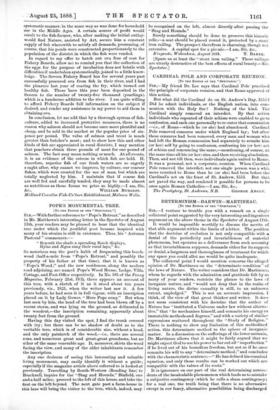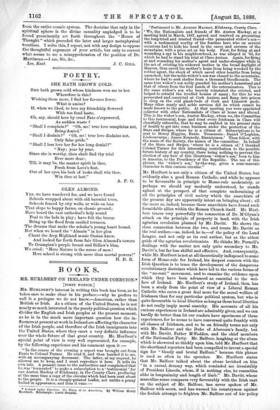DETERMINISM—DARWIN—MARTINEAU.
[To THE EDITOR OF THE "SPECTATOR,"] venture to trouble you with a remark on a single collateral point suggested by the very interesting and ingenious argument on the above theme in the Spectator of August 11th.
It would be impossible worthily to discuss the merits of that able argument within the limits of & letter. The position that the doctrine of evolution is not only compatible with a denial of the periodicity and invariableness of material phenomena, but operates as a deliverance from such necessity as that invariableness supposes, demands either for its support or denial, a largeness and thoroughness of treatment for which any space you could allot me would be quite inadequate.
The collateral point I would mention concerns the alleged opinion of Dr. Martineau on the "determinate condition" of the laws of Nature. The writer considers that Dr. Martineau, whom he regards with the admiration and gratitude felt by so many of your readers, restricts the phrase to the laws of inorganic nature, and "would not deny that in the realm of living nature, the divine causality is still, to an unknown extent, unpledged." This is not an accurate impression, I think, of the view of that great thinker and writer. It does not seem consistent with his doctrine that the author of Nature has "instituted a Universe under law without alterna- tive," that "he mechanises himself, and commits his energy to immutable methods and degrees," and with a variety of similar expressions scattered throughout the "Study of Religion." There is nothing to show any limitation of this methodised action, this determinate method to the sphere of inorganic matter. In a discussion on the sufferings of the lower animals, Dr. Martineau allows that it might be fairly argued that we might expect God to use his power to bar out all " imperfection " if he lived oat of his boundless freedom, but not so if he once
commits his will to any "determinate method ;" and concludes with the characteristic sentence,—" He has defined his cosmical equation, and only those results can be worked out which are compatible with the values of its roots."
It is ignorance on our part of the real determining antece- dents of the incalculable phenomenon which leads us to mistake a subjective contingency (which he calls a sham contingency) for a real one, the truth being that there is no alternative except in our fancy, alternative possibilities being discharged
from the entire cosmic system. The doctrine that only in the spiritual sphere is the divine causality unpledged is to be found prominently set forth throughout the "Hours of Thought" which preceded the later and larger metaphysical treatises. I write this, I repeat, not with any design to oppose the thoughtful argument of your article, but only to correct what seems to me a misapprehension of the position of Dr. Martineau.—I am, Sir, &c.,



































 Previous page
Previous page